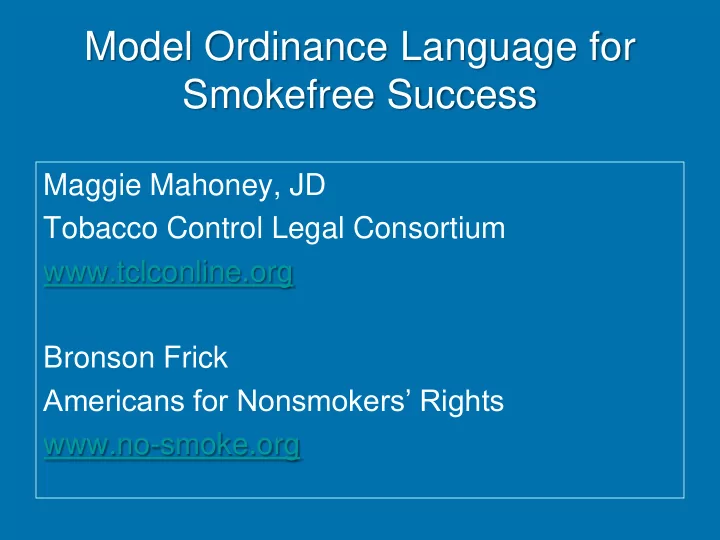

Model Ordinance Language for Smokefree Success Maggie Mahoney, JD Tobacco Control Legal Consortium www.tclconline.org Bronson Frick Americans for Nonsmokers’ Rights www.no-smoke.org
The Tobacco Control Legal Consortium A national legal network supporting tobacco control policy change.
What We Do: • Policy development • Legal research, analysis, and interpretation • Education and training • Litigation support
1980s 1990s 2000 & beyond Smoking Sections Smoking Rooms 100% Smokefree
2006 Surgeon General’s Report • There is no risk-free level of exposure to secondhand smoke. • Ventilation of the air cannot eliminate all the health risks caused by exposure to secondhand smoke.
Plan before you act
Guiding Principles • Plan before you act • Agree on “ Dealbreakers ” • Be realistic about resources • Start with a strong grassroots base • Start with model policy language • Include expert advisors • Importance of broad-based community support
Examples of Policy Dealbreakers • Preemption • Ventilation/Smoking Rooms • Hours/Age Restrictions • Signage (Red-Light, Green-Light) • Grandfather Clauses • Exemptions – Where to draw the line?
Agree on Dealbreakers & Key Principles Early in Process Put decisions in writing
ANR Model Ordinance • http://no-smoke.org/document.php?id=229 • Key Updates: Definitions E-Cigs Restaurant/Bar patios Penalties/Enforcement • Issues to Watch: – 100% smokefree hotels (WI) – Medical marijuana SHS – Other emerging issues
Electronic Cigarettes • Enforcement issues and findings; not a tobacco product • "E-cigarette" - any electronic oral device, such as one composed of a heating element, battery, and/or electronic circuit, which provides a vapor of nicotine or any other substances, and the use or inhalation of which simulates smoking. The term shall include any such device, whether manufactured, distributed, marketed, or sold as an e-cigarette, e-cigar, e-pipe, or under any other product name or descriptor. • "Smoking" means inhaling, exhaling, burning, or carrying any lighted or heated cigar, cigarette, or pipe, or any other lighted or heated tobacco or plant product intended for inhalation, in any manner or in any form. "Smoking" also includes the use of an e-cigarette which creates a vapor, in any manner or in any form, or the use of any oral smoking device for the purpose of circumventing the prohibition of smoking in this Article.
Other Definitions, such as: • "Enclosed Area" means all space between a floor and a ceiling that is bounded on all sides by walls, doorways, or windows, whether open or closed. A wall includes any retractable divider, garage door, or other physical barrier, whether temporary or permanent. • "Place of Employment" means an enclosed area under the control of a public or private employer . . . . (Sec. 1005 prohibits smoking “in all enclosed areas of places of employment without exception.”)
Proprietors’ Duties Sec. 1011. Posting of Signs and Removal of Ashtrays The owner, operator, manager, or other person in control . . . shall: • [P]ost "No Smoking" signs . . . in that place. • [P]ost at every entrance to that place a sign stating that smoking is prohibited. • [P]ost on every vehicle that constitutes a place of employment . . . at least one sign . . . stating that smoking is prohibited. • Remove all ashtrays from any area where smoking is prohibited by this Article, except for ashtrays displayed for sale and not for use on the premises. Sec. 1013. Enforcement . . . An owner, manager, operator, or employee of an establishment regulated by this Article shall direct a person who is smoking in violation of this Article to extinguish the product being smoked. If the person does not stop smoking, the owner, manager, operator, or employee shall refuse service and shall immediately ask the person to leave the premises. If the person in violation refuses to leave the premises, the owner, manager, operator, or employee shall contact a law enforcement agency. . . .
Thank you Maggie Mahoney, JD Tobacco Control Legal Consortium www.tclconline.org Bronson Frick Americans for Nonsmokers’ Rights www.no-smoke.org
Recommend
More recommend